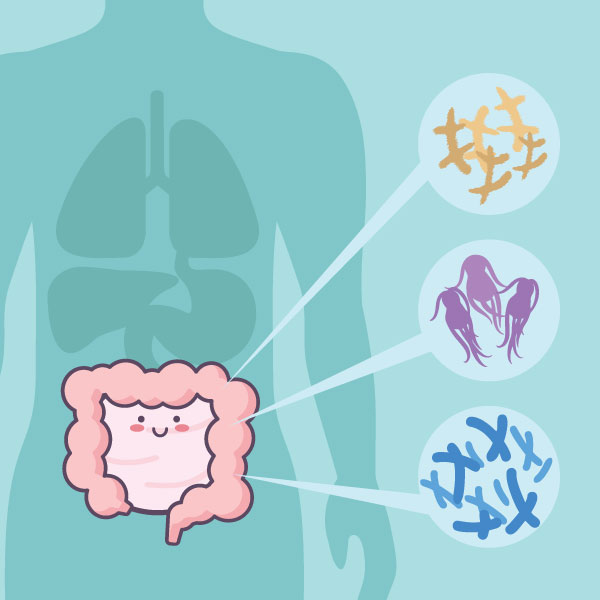The gut microbiota refers to the community of microorganisms that live in the digestive system. These microorganisms can influence our health condition and help in modulating our immune system.
Having a balanced gut microbiota is important as the good bacteria in the digestive system handle many important roles such as:
- strengthening your immune system – the digestive system is one of the body’s important line of defence against disease. Good bacteria play an important role by helping defend against toxins and infections from harmful microorganisms.
- nutrient absorption – good bacteria also help maximise nutrient absorption by helping the body to break food down into easily absorbed components.
On the other hand, an imbalanced gut microbiota could lead to all sorts of problems such as diarrhoea, irritable bowel syndrome (IBS) or constipation, heart disease, infections, and cancer.
All these factors play a role in determining your child’s quality of life. Thus, having a well-balanced gut microbiota helps ensure better gut health.
The Start of Gut Microbiota…
Your baby will get his first ‘dose’ of gut microbiota from his mother and from the environment. The initial ‘seeding’ of gut microbiota (i.e. during vaginal birth and from breast milk) plays an important role not just as he is growing, but also during his adult years. Baby’s gut microbiota consists of a mix of bacteria, e.g. Bifidobacteria and lactic acid bacteria such as Lactobacillus, both of which are important types of good bacteria which can be acquired from birth or from probiotic-rich foods. Studies have shown the ratio of Lactobacillus to Bifidobacteria in breastfed babies is 2 to 8.
In addition to nurturing your baby with the nutrients that he needs, breast milk also contains prebiotics (food for good bacteria) in the form of oligosaccharides, which encourage specific beneficial bacterial groups to grow. Studies have shown that the gut microbiota of breast-fed newborns is more stable and uniform when compared against babies who are formula-fed, and they have less bad bacteria proliferating in their guts.
Building Up the Good Bacteria
In order to help your baby or toddler to achieve a well-balanced gut microbiota, you should ensure that he eats sufficient prebiotics and probiotic-rich foods. Prebiotics are foods which ultimately feed the probiotics, or good bacteria in his digestive system.
Once your baby is weaned off breast milk, you can continue maintaining a healthy balance of gut microbiota for him by:
Providing him with a healthy diet: regardless of whether you are starting complementary foods or if it is meant for an older child, stick with healthy foods and minimise sugary foods or beverages and junk food. For older children, make it a point to provide them with more wholegrain foods and fruits and vegetables; these are necessary to achieve a balanced and healthy diet by providing your child’s body with sufficient nutrients and provide dietary fibre.
Ensuring he eats more fruits and vegetables: they are good sources for antioxidants, phytochemicals, vitamins and minerals. Some fruits and vegetables also make excellent prebiotics, such as banana, asparagus, garlic, and onions. Lentils are also known to contain galacto-oligosaccharides (GOS), which encourage the growth of good bacteria while simultaneously inhibiting bad bacteria.
Giving him more probiotic-rich foods: good sources for probiotics include fermented milk products (e.g. yoghurt, cultured milk drink), fermented soy products (e.g. tempeh), kimchi and pickles. Be sure to check the sugar or salt content of commercial products to hel ensure that your child does not eat too much sugar or salt.
Ensuring he gets enough sleep: growing children need sufficient sleep to ensure that their health and growth are not placed at risk. In 2016, a study linked sleep loss with changes in gut microbiota which then increased the risk of obesity and type 2 diabetes.
The health of individuals can be influenced by the diversity of microorganisms colonising the gut, which can be especially important in regulating both intestinal and immune development in infants. As parents, ensure your child receives the best possible start in life not just from birth (e.g. vaginal birth and breastfeeding), but also as he grows up well and healthy by implementing the tips above.
An educational contribution by Malaysian Paediatric Association.











Comments